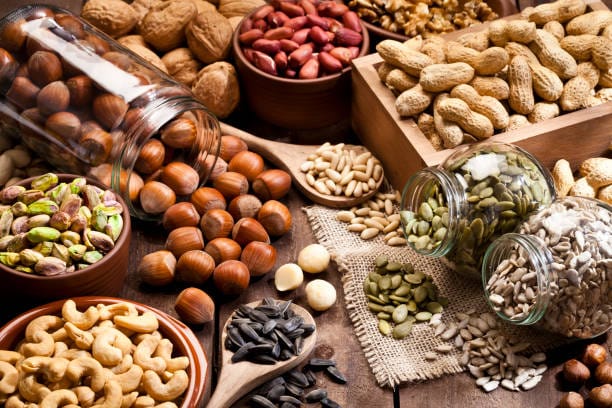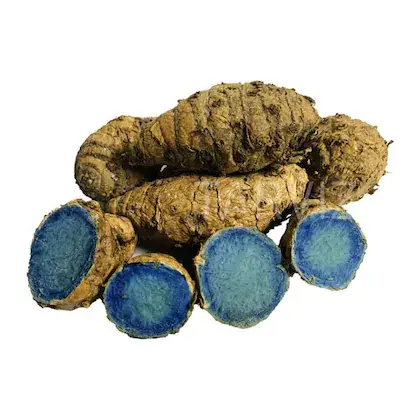
1). Flax Seeds
Small, nutrient-dense seeds, rich in omega-3 fatty acids, fiber, and antioxidants. They offer a variety of health benefits, including improving heart health by reducing cholesterol, promoting digestive health due to their high fiber content, and supporting weight management by increasing feelings of fullness. Flax seeds are also known for their potential to regulate blood sugar levels and reduce inflammation. Additionally, they contain lignans, which may have anticancer properties. Flax seeds can be consumed whole, ground, or as oil.
2). Chia Seeds
These are tiny, nutrient-packed seeds. They are rich in omega-3 fatty acids, fiber, protein, and antioxidants. Chia seeds offer various health benefits, such as promoting heart health by lowering cholesterol, aiding in digestion due to their high fiber content, and supporting hydration because they absorb liquid and form a gel-like substance. They also help in weight management by increasing satiety and stabilizing blood sugar levels. Chia seeds are easy to incorporate into your diet, adding them to smoothies, oatmeal, or baked goods.
3). Pumpkin
Pumpkin seeds are nutrient-dense seeds from pumpkins. They are an excellent source of magnesium, zinc, iron, protein, and healthy fats. Pumpkin seeds offer numerous health benefits, including promoting heart health by improving cholesterol levels, supporting prostate health, and enhancing immune function due to their high zinc content. Rich in antioxidants, they also help reduce inflammation and support better sleep with their natural magnesium content. Pumpkin seeds can be eaten raw, roasted, or added to salads, granola, and baked goods.
4). Sunflower Seeds
They are rich in healthy fats, particularly polyunsaturated fats, protein, fiber, and essential vitamins and minerals, including vitamin E, magnesium, and selenium. Sunflower seeds offer various health benefits, such as supporting heart health by lowering cholesterol levels, improving skin health due to their high vitamin E content, and boosting immunity with antioxidants. They also help in reducing inflammation and may support bone health due to their magnesium content.
5). Sesame Seeds
These are small, nutrient-rich seeds from the sesame plant. They are an excellent source of healthy fats, protein, fiber, and important minerals like calcium, iron, magnesium, and zinc. Sesame seeds offer a variety of health benefits, including supporting heart health by lowering cholesterol levels, improving bone health due to their high calcium content, and providing antioxidants that protect against oxidative stress. They also help with digestive health and may have anti-inflammatory properties.
6). Almonds
Almonds are nutrient-dense nuts packed with healthy fats, protein, fiber, vitamins (especially vitamin E), and minerals like magnesium and calcium. They offer a range of health benefits, including promoting heart health by lowering bad cholesterol, supporting brain function with their high vitamin E content, and aiding in weight management by increasing satiety. Almonds also help regulate blood sugar levels and improve bone health. Consuming them regularly can boost immune function and provide antioxidants to protect against oxidative stress. They can be eaten raw, roasted, or added to various dishes like salads, snacks, and smoothies.
7). Brazil Nuts
Rich nutrient-packed nuts are native to the Amazon rainforest. They are an excellent source of healthy fats, protein, fiber, and vital minerals like magnesium and phosphorus. One of their key benefits is their high selenium content, an antioxidant that supports immune function, and thyroid health, and may help reduce inflammation. Brazil nuts also promote heart health by improving cholesterol levels and providing bone-strengthening minerals like calcium and magnesium. Due to their high selenium levels, just a few nuts a day can provide significant health benefits. They are commonly eaten raw or added to snacks, salads, and desserts.
8). Cashews
Cashew nuts are creamy, flavorful nuts packed with healthy fats, protein, vitamins (such as vitamins E and K), and essential minerals like magnesium, copper, and zinc. They offer various health benefits, including promoting heart health by lowering bad cholesterol levels, supporting bone health with their magnesium and copper content, and boosting immunity due to their antioxidant properties. Cashews also help with weight management by promoting satiety and may improve eye health because of their high levels of vitamin E. They can be eaten raw, roasted, or added to dishes like salads, curries, and snacks.
9). Walnuts
Walnuts are nutrient-dense nuts rich in healthy fats, particularly omega-3 fatty acids, protein, fiber, and antioxidants. They offer a variety of health benefits, including promoting heart health by reducing cholesterol and inflammation, supporting brain function due to their high omega-3 content, and improving mood. Walnuts also help regulate blood sugar levels and may have anti-cancer properties. They are beneficial for weight management as they promote satiety. Walnuts can be eaten raw, roasted, or added to salads, baked goods, and snacks.
10). Pistachios
Pistachios are small, nutrient-rich nuts packed with healthy fats, protein, fiber, vitamins (such as vitamin B6 and E), and minerals like potassium and magnesium. They offer several health benefits, including promoting heart health by improving cholesterol levels, supporting weight management due to their high protein and fiber content, and aiding in digestion. Pistachios also help regulate blood sugar levels, boost eye health with their antioxidant content, and may improve gut health. They can be eaten raw, roasted, or added to salads, snacks, and desserts.
Recommended Daily Intake
The recommended intake of nuts and seeds typically ranges from 1 to 1.5 ounces (about 28–42 grams) for adults. This equates to approximately a small handful. For specific nuts and seeds, the following guidelines are common:
- Nuts: Around 1 ounce (about 23 almonds, 14 walnut halves, or 18 cashews)
- Seeds: About 1 ounce of seeds like chia, flax, pumpkin, sunflower, or sesame seeds is ideal.
This intake helps provide essential nutrients like healthy fats, protein, fiber, vitamins, and minerals while supporting heart health, weight management, and overall well-being. Consuming a variety of nuts and seeds can maximize the benefits.
RELATED POSTS
View all



